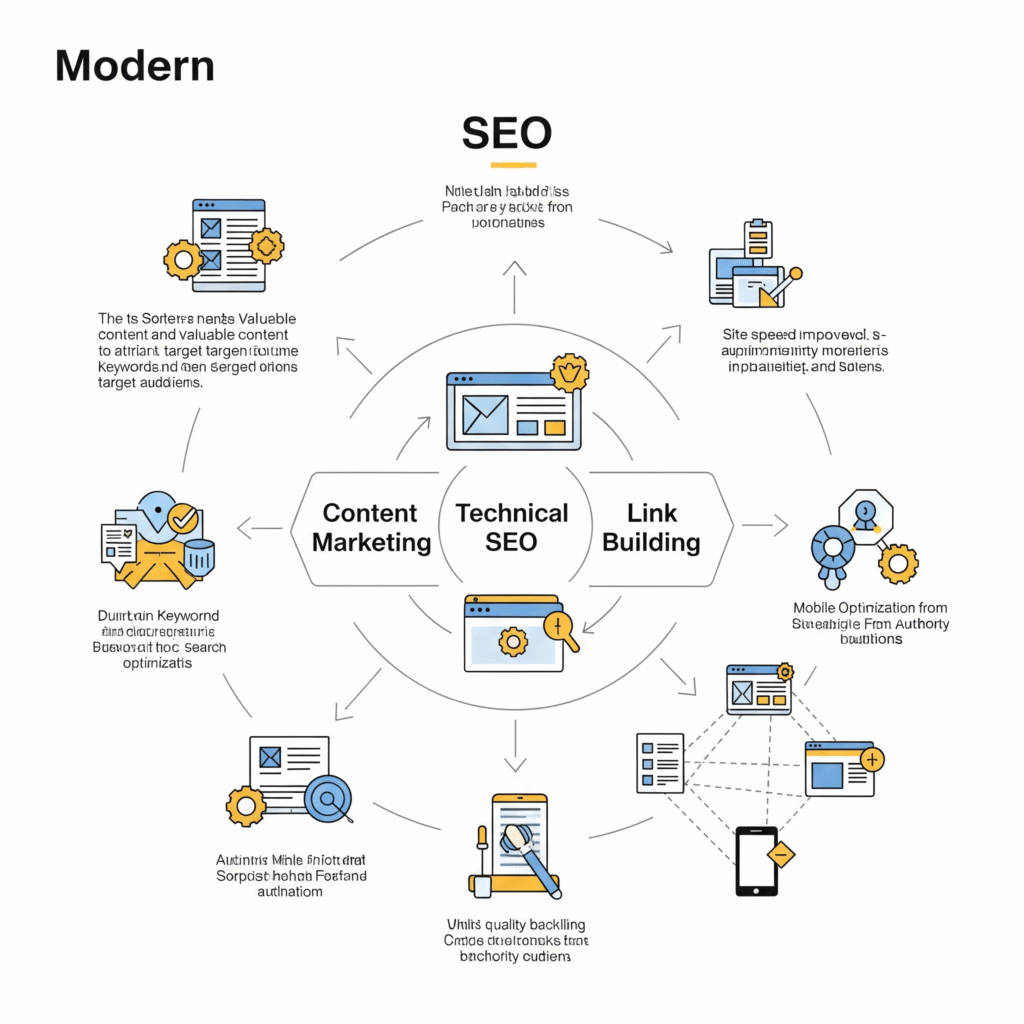The Full History of SEO, From Inception to Imperative End
The History of SEO: How It Started and What Happened Next
The history of SEO is intricately linked with the evolution of the Internet, particularly with the rise and advancement of search engines. Understanding its past is crucial to grasping its relevance today. By tracing its journey from inception, navigating through numerous algorithmic changes, and exploring the driving forces behind its continuous evolution, you will understand why leveraging the power of SEO tools is vital for your online business growth.
The Dawn of Search and the Inception of SEO
SEO was born in the early days of the World Wide Web in the mid-1990s. It became an urgent challenge as the Internet became ubiquitous, and many sites exploded beyond count. Early internet search engines such as AltaVista, Yahoo! Directory, Lycos, and Excite were among the sites that arose as a challenge, trying to organize and rank the mass of new content popping up online.
In its early days, search engine optimization (SEO) involved little in optimizing the website, but ground-level foundations were being implemented. Pumiced website owners discovered that different factors, such as keywords in the text and Meta tags, created the conditions for optimal indexing and ranking of their pages by these early search engines. It was the unofficial start of SEO.
At first, the “techniques” were rudimentary and easily abused. As a result, many web admins adopted keyword stuffing, which involved cramming many keywords into their content or Meta tags. The emphasis was predominantly on the volume of content, not on whether the content was remarkably accurate or valuable, or on the readers’ experience. Such tactics could fool these early search engines with their primitive algorithms.
The commercialization of the early Internet era also saw the birth of Google in 1998, founded by Larry Page and Sergey Brin. Google’s approach to search was revolutionary. It measured a page’s quality and quantity of backlinks to determine its authority and importance. This unique system marked a significant milestone in the SEO timeline, shaping the industry as we know it today.

Google Age and the Evolution of SEO
The advent of PageRank required website owners to rethink how they viewed their content, forcing them to invest in actual authority and earn links from other established sites. During this period, different, more advanced methods of SEO were also being introduced:
Link building: Actively pursuing and acquiring backlinks from high-quality, relevant sources was a big part of SEO.
Content Creation (in its early form): There wasn’t as much to shout about as today, but there was a realization that good content wins both people and links.
Website Structure and Navigation: Optimizing a website’s internal linking structure and navigation to improve crawlability and user experience began to gain importance.
The early 2000s witnessed Google’s rapid ascent to dominate the search engine market. As Google’s algorithms became more complex, so did the SEO field. Keyword stuffing and other manipulative tactics became less effective, and Google began to penalize websites that engaged in such practices.
Catalysts that Define SEO: Some Key Algorithm Updates That Turned the Tide of SEO’s History
The history of Google features ever-changing algorithms that have significantly impacted the SEO industry. Here are some of the most important changes:
Google Panda (2011): This update focused on low-quality content and duplicate or thin sites. It underscored the importance of high-quality original content that adds value to users and indicated that it marked a significant move towards rewarding user-focused content.
Google Penguin (2012): Penguin targeted manipulative link-building schemes, such as buying links or participating in link farms. It stressed the need for natural and relevant backlinks.
Google Hummingbird (2013): This update emphasized semantic search, trying to figure out the intention behind the user’s query rather than just throwing together a bunch of keywords. It’s become all about content that answers the user’s query.
Mobile-First Indexing (Rollout Started in 2016): Acknowledging the rise of mobile browsing, Google is now approaching indexing and ranking with the mobile version of a website as the primary source. It has brought mobile-friendliness to the forefront as an SEO factor.
Google BERT (2019): BERT (Bidirectional Encoder Representations from Transformers) helped Google better understand natural language to understand better the context in which your site content and search queries were meant to be interpreted.
Core Web Vitals (2020-2021): This update concentrated on user experience metrics, including loading time, interactivity, and visual stability, and introduced page experience as a direct ranking factor.
Helpful Content Update (2022 on): This series of updates favors content made for humans, not search engines, and punishes useless or purely ranking-focused content with lower rankings.
Spam Updates (Drills, Baby): Google never stops developing new spam drills to combat all types of spam, whether link spam, content spam, or the latest slug of the hour, AI-created spam.
These updates are just a glimpse of the countless changes that demonstrate the continuous evolution of search algorithms. SEO practitioners must stay tuned to these updates to understand what strategies work and what don’t. The SEO landscape has constantly adapted to these algorithm shifts, making it a dynamic and engaging field.
The Gradual and Increasing Demand for SEO
The need for SEO has been increasing more and more since the dawn of the Internet age, and the following are some of the contributors to its current status:
Increasing Internet Usage: As people and businesses move online, the Internet has become the go-to source for information, products, and services. It naturally enhances the significance of appearing on SERPs.
Search Engine Dominance: Search engines (in particular, Google) now dictate how we use the Internet. Appearing within a top placement in the search results is essential to ensure businesses are visible to their target audience.
Realization of Organic Traffic Value: Businesses have begun to understand the value of organic traffic—visitors driven to their site due to unpaid search results. Organic visitors are usually more engaged and convert better than visitors from paid ads.
Complexity of Search Engine Algorithms and Ranking: Due to the increasing complexity of search engine algorithms, specialized knowledge and skills are required to achieve higher rankings. It has made SEO professionals and companies very much in demand.
Competitive Online Landscape: The online marketplace is incredibly competitive. Businesses realize that without effective SEO, they risk being buried in search results and losing potential customers to competitors who have invested in SEO.
Data-Driven Marketing: SEO can provide quantifiable results. Business owners can monitor their keywords’ ranking, website traffic, leads, sales, and ROI on their SEO campaigns. This data-centric nature of SEO makes it both an enticing and measurable marketing strategy.
Integration with Other Digital Marketing Channels: Businesses understand that SEO works synergistically with other digital marketing efforts, such as content marketing, social media, and paid advertising, creating a more holistic and effective online presence.

The Projected Growth of the SEO Industry in the Near Future
Soon, the SEO industry is expected to grow even more. There are several reasons for this bright perspective:
Ongoing Internet and Mobile Expansion: The global Internet population is rising everywhere, with emerging markets showing the most significant growth. The rated suppliers can now be accessed from your mobile device without the need to scroll or zoom in and out of the product pages.
Emerging Search Technologies: AI search capabilities like Google’s Search Generative Experience (SGE) and other developments in natural language processing will continue to muddy the waters in search, creating more demand for SEO professionals who can keep up.
User Experience is Key: Search engines will likely continue to favor websites with good user experiences. SEO professionals who know their technical SEO, site speed optimization, and user-centric design principles will be required.
The Importance of Content: Well-written, relevant, and engaging content is still the core of successful SEO. It will drive the need for SEO work, strategic content strategies, and content marketing.
The Rise of Mobile-Driven Local Searches: As mobile becomes a more dominant device for local searches, local SEO will continue to rise in importance for businesses with physical locations. It will also increase the demand for regional SEO specialists.
Voice Search and Visual Search Integration: With the rise of voice search and visual search, the scope of SEO has changed, challenging traditional search marketers to tap into voice search queries to ensure they rank for visual-content searches.
The Ever-Changing Algorithm: The continuous updates to search engine algorithms will necessitate ongoing SEO efforts and the expertise of professionals who can stay ahead of these changes.
The SEO market has been considered a virtual “rocket” in the digital marketing industry, and the value-added of the market size is accelerating with time. The SEO market is forecasted very positively, contributing substantially to the virtues of the overall SEO framework.
The Importance of SEO to Your Business in Today’s Market
SEO is no longer a luxury; it is a necessity in this digital age and for any business that wants to be successful on the web. Here’s why:
Dominant Source of Site Traffic: Organic search traffic is a primary driver of website visitors for most businesses. Effective SEO ensures a consistent flow of targeted traffic from users actively looking for your products or services.
Cost-Effective Marketing Strategy: SEO organic traffic is free compared to other paid pop techniques. It takes time and resources, but the long-term return on investment can be much greater than paying for ads.
Builds Trust and Credibility: Organic search results are where users trust and find the most credible information – the higher you are ranked organically, the more users trust and credibility they perceive your site to have. Effective SEO helps your brand establish credibility and trust.
Target the Right Audience: When done well, SEO focuses on the keywords and phrases people are most likely to use to find your product or service. It ensures that you are reaching the right audience, aka the right people, to get your message in front of them.
Provides Long-Term Sustainable Results: Paid advertising stops delivering traffic the minute your budget is no more, but good-quality SEO is the foundation for long-term online visibility and organic growth in SEO services.
Provides Valuable Insights: SEO analytics can provide valuable insights into your audience, their searches, and how your content performs. You can use them to help guide your more general marketing and content creation strategy.
Necessity for Local Businesses: Local SEO is essential for businesses that maintain a physical location. It also helps them capture local customers looking for local products or services.
The Peril of Neglecting SEO: Falling Far Behind the Competition
If companies decide not to use SEO in their marketing strategy, they will fall significantly behind the competition, at least in the long run:
Lack of Exposure: If your website isn’t visible in the SERPs, customers will have no way of knowing that it even exists. You’ll be invisible to prospective customers on the Internet, and all that relevant traffic will leave for your competition.
Missed opportunities for traffic and leads: Thousands of people use search engines to find the exact solution your business offers. However, without SEO, these people will not be able to spot your website, and they will go to competitors who have invested in SEO.
Competitive Disadvantage: If your competitors invest in SEO and you do not, your business will always be at an unfair disadvantage. Your competitors are capturing a target audience that you could take, but your business will always be one step behind because you haven’t optimized your site for search engines.
Lower Brand Awareness: Users perceive websites with high rankings on the search results page as more trustworthy. If people see your website more often, your brand awareness will increase, and more and more people will talk about you.
Higher Customer Acquisition Cost: SEO provides free traffic, while paid advertising costs money. Therefore, performing only well-optimized advertising campaigns to attract traffic to the site will cost several times more than acquiring traffic through SEO.
Poor User Experience: In many cases, websites without SEO are beyond usability, as developers do not try to make them interesting to users. Poor user experience is a massive disadvantage of any website since it directly discourages potential clients.
Inability to Compete in the Digital Age: In today’s digital-first world, a strong online presence is crucial for survival. Neglecting SEO puts your business at a severe disadvantage and hinders your ability to compete effectively.
In conclusion, the evolution of SEO tells of the complex relationship between websites and search engines. From the primitive, weedy patch at its inception, SEO has become the vital organic component of the digital landscape we all experience today. If ever rising and projected to rise further, indicate its importance. To make their business successful by 2025, they can’t just consider hiring professional SEO services. Instead, this is the need of the hour to ensure one is visible in the web world, attracting customers, and not behind the curve in the digital rat race. When you ignore SEO, it’s like establishing a retail outlet in an Internet black hole, guaranteed to be swallowed up by the web.







